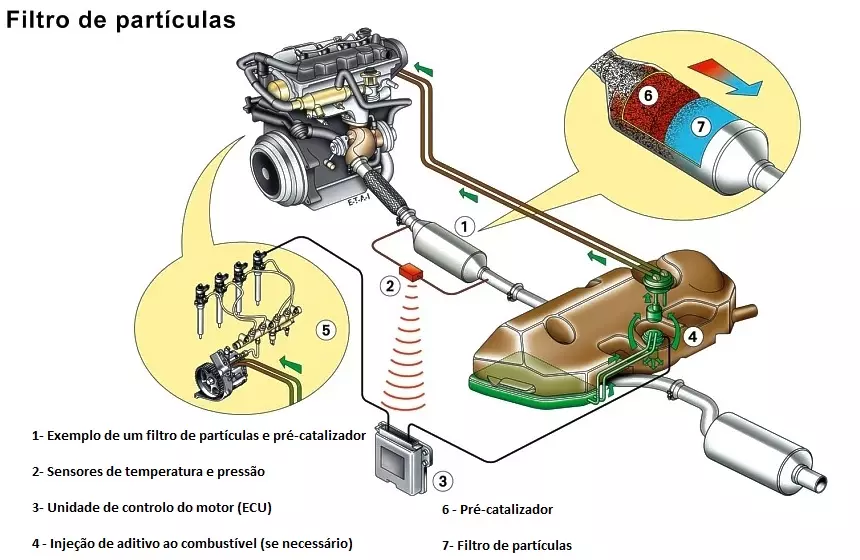Portugal is one of the countries in Europe where the consumer trend towards Diesel engines is greater. It's been that way for the past 20 years but it won't be that way for years to come. In fact, it isn't anymore, with the small gasoline engines gaining ground.
Although the Portuguese are culturally “pro-diesel” (taxation continues to help…), the truth is that most consumers do not know how to use modern diesel engines effectively, in order to avoid greater harm. Whose fault is it? Partly it is the dealers who do not always inform customers as they should, and on the other hand, the drivers themselves who use the cars unaware of the behavior they should adopt - conduct that is legitimate but sometimes costs (a lot) money. And nobody likes having extra expenses, right?
Driving a modern Diesel is not the same as driving an Otto/Atkinson
I remember the first time I drove a Diesel. The phrase “you must let the resistance light go out before starting the engine” was etched in my memory. I share this reminiscence with one purpose: to demonstrate that Diesels have always had some operating idiosyncrasies and now have them more than ever.
Due to environmental regulations, diesel engines have evolved immensely in recent decades. From poor relatives of gasoline engines, they became highly technological engines, with high performance and even more efficient. With this evolution also came greater technological complexity, and inevitably some operating problems that we want you to be able to avoid or at least alleviate. EGR valve and particulate filter is the name of just two technologies that have recently entered the lexicon of almost all diesel-powered car owners. Technologies these that have caused the shivers to many users...

As you may know, the particle filter is a ceramic piece located in the exhaust line (see image above) which has the function of incinerating most of the particles produced during the combustion of diesel . In order for these particles to be incinerated and the filter not to clog, high and constant temperatures are necessary — hence, it is said that taking short daily trips “spoils” the engines. And the same applies to the EGR valve, responsible for the recirculation of exhaust gases through the combustion chamber.
Diesel engines with this type of technology require special care. Components such as the particle filter and EGR valve require more careful operating conditions to prevent damage to these components ( hat tip for Filipe Lourenço on our Facebook), namely reaching the ideal operating temperature. Conditions that are rarely met on city routes.
If you drive your diesel-powered car daily on urban routes, don't interrupt the regeneration cycles — if you feel the idle speed slightly higher than normal when you arrive at your destination, and/or the fan turns on, then it's a good idea to wait for it to burn. finish. As for long journeys, fear not. This type of path helps to clean combustion residues accumulated in the mechanics and particulate filter.
Changing habits to avoid greater harm
If you are adept at constantly shifting gears at too low revs, you know that this practice also contributes to mechanical degradation. As we explained a moment ago, modern diesel engines need high temperatures in the exhaust circuit to run at full capacity. But not only.Driving at too low rpm also causes stress on the engine's internal parts. : lubricants do not reach the recommended temperatures resulting in greater friction, and passing through mechanics' dead spots requires greater effort from the moving components (rods, segments, valves, etc.). Hence, raising the engine speed a little more is not a bad practice, on the contrary . Naturally, we are not suggesting that you take your engine to full revs.
Another very important practice, especially after long journeys: do not turn off the engine immediately after the end of the trip. . Let the engine run for another couple of minutes so that your car's mechanical components cool down less abruptly and more evenly, promoting the lubrication of all components, especially the turbo. A piece of advice that is also valid for gasoline mechanics.
Is it still worth buying a Diesel?
Each time fewer. Acquisition costs are higher, maintenance is more expensive and driving pleasure is lower (more noise). With the arrival of direct injection and more efficient turbos to gasoline engines, buying Diesel is more and more a stubborn decision than a sensible decision. In most cases, it takes years for you to pay off the option for a model with a Diesel engine. Furthermore, with the threats that loom over Diesel engines, many doubts fall on future recovery values.
If you haven't driven a model equipped with a modern gasoline engine yet (examples: Opel Astra 1.0 Turbo, Volkswagen Golf 1.0 TSI, Hyundai i30 1.0 T-GDi or Renault Mégane 1.2 TCe), then you should. You will be surprised. Check with your dealer which is the best option for your needs. Contrary to what you might think, it might not be a Diesel. Calculators and Excel sheets are relentless...
